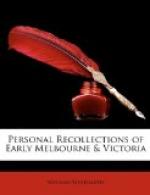No doubt it was in very great measure because money was scarce and dear that nearly everything was thus cheap. I recollect the sale by auction at that time of a vacant half-acre allotment in central Collins-street, next to that on which Mr. George James, wine merchant, had very early erected his surpassing brick office and dwelling. After some slight competition, the allotment, put up, I think, at the upset price of 300 pounds, was bought by Mr. Edmund Westby for 344 pounds. The amount is impressed upon me, because I wondered at the time that anyone should thus throw away so much good money. But my friend Westby reckoned the future more accurately than I did, for within nine years after, this price was hardly the 500th part of the value. To cap the whole tale, the lot was, I think, in the hands of Government from having been abandoned by the original buyer, who had forfeited his deposit rather than complete his supposed bad bargain.
According to my recollection, the first of our sober community to set up a carriage and pair was Mr. Henry Moor, above alluded to. Even His Honour the Superintendent had no such luxury at that time. I remember looking upon that vehicle with a sense of awe, possibly not without envy at what was to most of us the entirely unattainable. I speak of the real Hyde Park Corner article, and not the old “shandrydan” with which some remote squatter might at times have galloped into town, poising himself with practised and needed adroitness on nature’s bush track, behind a pair or more of the hundreds of nags on his run. I must except also those said anomalous early years, for I recollect sallying forth in 1841 from my little lodging in Lonsdale-street, opposite the old gaol, then being erected, to see Mr. John Hunter Patterson, a spirited colonist of the earliest times, drive his splendid four-in-hand through the trackless bush into town from the direction of the Moonee Ponds.
RELIGIOUS INTERESTS.
Our small society, in its upward struggle, received a distinctly great impetus for good by the accession in 1848 of the first Lord Bishop of the colony, Dr. Charles Perry. He exhibited a rare energy in the cause of his Divine Master, and he frankly and genially sought and recognized that Master’s Church far beyond the pale of the Bishop’s own section of it, so far at least as the rules of that section would permit. But the good Bishop, liberal as he was in one direction, yet failed to reach the full width of colonial sentiment in that respect, when he refused to reciprocate the courtesy visit of his Roman Catholic brother. He is credited with having given his reason, namely, that, in his view, the Roman Church belonged to “the synagogue of Satan”—surely a very venturesome assertion of so vast a part of Christianity and of the power and civilization of the world. We might say at times of bishops, as is so often said of judges, that when they have to




